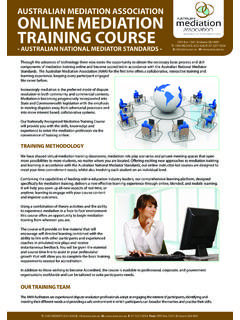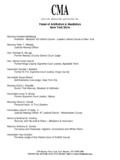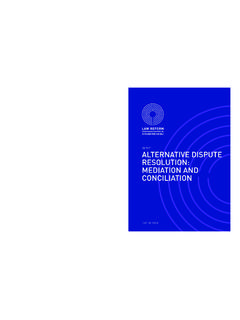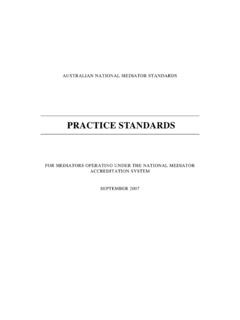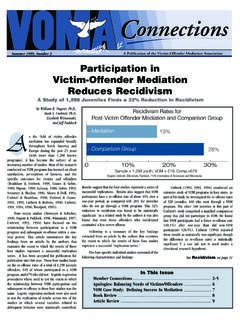Transcription of Mediation Theory & Practice – 9 Day Accredited Training …
1 Mediation Theory & Practice 9 Day Accredited Training Course Course Outline Mediation Theory & Practice is Accredited by the Open College Network Northern Ireland. This course is Accredited as a Level 3 course earning 9 credit points. This equates to an NVQ Level 3 or an Advanced Diploma. The course introduces a basic Mediation process for use in a two party dispute or in constructive relationship building. Learning Outcomes Participants to this Training will work towards achieving the following seven learning outcomes (full learning outcomes table follow): Understanding the anatomy of conflict Understanding the principles and Practice of Mediation Understanding how, when, why and where to use Mediation Knowledge, understanding and Practice of the 5 stage Mediation model Practice of co- Mediation Understanding of Mediation referral and administration systems necessary tooffer a Mediation serviceDates The course runs over 9 days, and the next course dates are: September 19th, 26th October 3rd, 10th, 17th, 24th November 7th, 14th, 21stTraining starts at 9.
2 30am each day and concludes no later than 4:30pm. 83 University Street Belfast, BT7 1HP 028 9043 8614 Fees The price per person is 875. (Discounts available for multiple bookings) This price is inclusive of: 9 full days of Training Training Manual Support for OCNNI Portfolio completion OCNNI Level 3 accreditation and certification Mediation Northern Ireland certification Catering during Training daysAccreditation Participants gain a formal qualification Mediation Theory & Practice , at OCN Level 3 (9 credits). This will be based on worksheets filled in during the course there will be no exams, essays etc. In order to receive accreditation, participants must attend 80% of the Training sessions.
3 Is this the recognized qualification for Mediators in the UK and ROI? This is one of the recognized qualifications for mediators in the UK and ROI. *please note that as with almost all caring professions, professional Practice inmediation requires both a combination of qualification and Practice experience. Having achieved this qualification trainees will be ready to begin supervised Practice within their own organisation or with Mediation Northern Ireland. Following the completion of two supervised Practice cases trainees would then be considered to have reached the standard level of professional Practice required in Mediation . Supervision of Practice can be completed internally through a process of peer supervision or through line manager supervision.
4 Additional Support: Whilst we encourage all participants to attend all sessions we recognise that trainees sometimes have to miss a day. In these circumstances we will arrange a catch-up tutorial with you so ensure you do not miss the content covered during this session. For participants who wish to review the days learning, want to explore the topics covered in greater detail or have struggled with some of the content, we run an hours tutorial at the end of each Training session (4:30 5:30pm) for anyone who wishes to avail of Theory & Practice This unit has 7 learning outcomes. LEARNING OUTCOMES ASSESSMENT CRITERIA The learner will: The learner can: conflict and associated Summarise the meaning of conflict.
5 Analyse conflict behaviour. Explain and analyse styles of conflict in relation to own behaviour. and apply conflict Explain and analyse conflict strategies. Analyse a conflict case study. Develop and implement a plan to address a conflict situation. the process of Summarise different types of mediative activity. Develop and implement a plan to address a two-party Mediation scenario. Describe good Practice appropriate to individual case work. Demonstrate interpersonal skills. Evaluate two-party Mediation scenario. the role of the mediator Explain the role of the mediator in a Mediation process. Analyse the mediator s role. Summarise personal values required by a mediator.
6 Objectives of initial assessmentand case Summarise objectives of an initial assessment and case development. Evaluate and analyse outcome of assessment. the philosophical and ethicaldimension to conflict Summarise the philosophical and ethical dimension to conflict intervention. skills for assessing Summarise a conflict situation. Develop a process for third-party intervention. Mediation Theory & Practice - Sample delivery model DAY ONE Introductions and outline to the Training and OCN accreditation. Learning Contract Understanding conflict Experiences of conflict in every day life Anatomy of conflict between colleagues and tool for analysis of that conflict Progression of conflict and use of early interventions Recognising Conflict Styles five styles movement between styles intentions within a conflict situation and corresponding style Recognising Conflict Skills recognising peoples conflict skills and where they developed from understanding conflict communication styles conflict mapping DAY TWO Conflict Dynamics negotiation exercise principles and outcomes self-interest in acting in a principled way during conflict and
7 Recognising the interdependence factor Group Dynamics and Systems Theories Opening up systems issues ie. group history, corporate character, conflict habits etc Responding to organisational change ie. reasons why people resist change and become fearful. Breaking the rules . How to create freedom to talk and to explore issues outside of the complaints frame. DAY THREE Introduction to Mediation Understanding of Mediation as a Practice of alternative dispute resolution Difference between Mediation and arbitration How to use Mediation in different contexts When to use Mediation Introduction to the 5 stage process of Mediation DAY FOUR Working through the 5 stage process of Mediation Introduction of the issues Storytelling by the parties Framing the issues Problem Solving Conclusion and agreement making DAY FIVE Case study Practice of the 5 stage model (stages 1-2) DAY SIX Case study Practice of the 5 stage model (stages 3-5)
8 DAY SEVEN Debrief of the case study Practice to identify challenges Dealing with resistance during Mediation Role of conflict counselling in Mediation preparation Role of individual meetings Working from interests rather than positions Role of shuttle Mediation Listening for hidden offers DAY EIGHT Agreements Drafting agreements Helping parties to hold agreement Working as a mediator Understanding the role of mediator Reflection of personal Mediation style challenges and skills Working with a co-mediator Giving and receiving constructive feedback Peer support and supervision DAY NINE Setting up Mediation systems and Mediation administration Ensuring confidentiality of the process and safety of the parties How to make/receive a referral Creating the occurrence log Recording notes of the sessions, conversations, etc.
9 A record of outcome and agreement Evaluation of the process and follow up on any agreement
